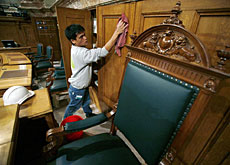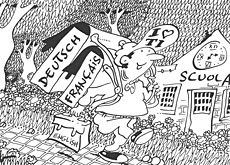Money and language set to fuel heated debates

The 2007 budget, the last one before next year's federal elections, is topping the agenda at parliament's winter session which starts on Monday in the capital Bern.
Other issues in the spotlight include debates on a new language law and ballots for next year’s Swiss president as well as the speakers of both parliamentary chambers.
After an extraordinary session in the mountain resort of Flims in autumn parliament has returned to its home in Bern where renovation work is still underway in the 100-year old building.
This winter session opens the final stretch of the four-year parliamentary term as elections loom in October next year followed by the cabinet election in December.
One of the most contentious issues during this session is next year’s federal budget to be debated in both the House of Representatives and the Senate.
The cabinet has pencilled in a surplus of SFr918 million ($766 million) based on SFr55.9 billion in revenue and SFr55 billion in expenditure – the first planned surplus in years.
The Senate is not likely to call for any major changes to the budget. But the House of Representatives will debate more than two dozen amendments from its own finance committee.
The aim is to save a few extra million through spending cuts for external consultancy mandates. Other changes include extra costs for the purchase of a vaccine to prevent a pandemic and extra revenue from an increase in a tobacco levy.
Three of the four main political parties said they would vote for the budget albeit grudgingly. The centre-left Social Democrats said they would call for a salary increase for federal employees since the government’s revenue had increased due to a healthier economy.
The rightwing Swiss People’s Party for its part warned it would reject the proposed budget, saying extra cuts to the tune of SFr140 million were necessary.
National language
Passionate debates are expected over a new language law that regulates the use of official languages and promotes understanding between the four different linguistic regions, the majority Swiss-German, as well as the French, Italian and Romansh-speakers.
The government has argued that no new legislation is necessary to complement a constitutional article agreed by Swiss voters ten years ago. Nevertheless parliament drafted a bill including regulations on foreign language teaching in schools.
Proponents want to give national languages preference over English. Several cantons, which traditionally enjoy a high degree of autonomy in education matters, have already introduced English as a first foreign language in their primary schools.

More
Multilingualism
Elections
As customary parliament also names new speakers and appoints the Swiss president for 2007 during the winter session.
Christine Egerszegi is taking over at the helm of the House of Representatives while Peter Bieri will chair the Senate for a one-year term.
The election for the post of next year’s president is scheduled for the second week. In 2007 it is the turn of the foreign minister, Micheline Calmy-Rey to take over the largely ceremonial post. She succeeds the transport minister, Moritz Leuenberger, according to a system of seniority in cabinet.
swissinfo, Urs Geiser

More
President of the Confederation
Next year’s budget foresees a surplus of SFr918 million and comes as the cabinet is seeking ways to cut spending.
The government plans to introduce gradual cuts in expenditure until 2015.
The government says 2006 will result in a SFr2.2 billion surplus, despite a planned deficit of about SFr700 million.
The combined deficit of Switzerland’s federal, cantonal and local governments was SFr239 billion at the end of 2004, which amounts to 53.5% of Switzerland’s Gross Domestic Product.

In compliance with the JTI standards
More: SWI swissinfo.ch certified by the Journalism Trust Initiative



You can find an overview of ongoing debates with our journalists here . Please join us!
If you want to start a conversation about a topic raised in this article or want to report factual errors, email us at english@swissinfo.ch.